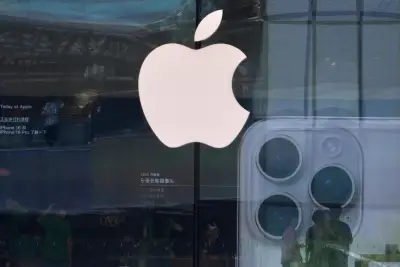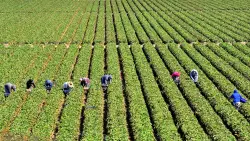Apple has had few incentives in the past to start making iPhones in US

By MICHAEL LIEDTKE AP Device Writer SAN FRANCISCO AP Unhappy that Apple intends to source nearly all of its U S iPhones from India President Donald Trump on Friday threatened a tariff on the popular device unless the tech giant moves production to the United States But Apple has seen little incentive in the past to manufacture domestically Related Articles Edmunds How to get the best auto deals this Memorial Day weekend Trump s latest tariff threats knock Wall Street European stocks and Apple lower Trump threatens tariffs on EU and penalties on Apple as his exchange war intensifies Microsoft fires employee who interrupted CEO s speech to protest AI tech for Israeli military Acme Tools opens Eagan storefront its first new Minnesota location in years Apple has traditionally produced its devices in China in massive factories that rely on a vast infrastructure of local suppliers The company s reliance on this relationship thrust the tool trendsetter into the crosshairs of Trump s pact war In response to the president s latest exchange with China Apple CEO Tim Cook commented earlier this month that largest part iPhones sold in the U S during the current fiscal quarter would come from India After Trump rolled out tariffs in April bank analysts estimated that a iPhone would if made in America jump in price anywhere from to The disincentives for Apple shifting its production domestically include a complex supply chain that it began building in China during the s It would take several years and cost billions of dollars to build new plants in the U S Combined with current economic forces the price of an iPhone could triple threatening to torpedo sales of Apple s marquee product The concept of making iPhones in the U S is a nonstarter asserted Wedbush Securities analyst Dan Ives reflecting a widely held view in the resources public that tracks Apple s every move He estimated that the current price tag for an iPhone made in China or India would soar to more than if production shifted to the U S And he believes that moving production domestically likely couldn t be done until at the earliest Price points would move so dramatically it s hard to comprehend Apple didn t this instant respond to a request for comment Friday On a quarterly earnings call earlier in May Cook narrated investors that tariffs had a limited impact on the company in the March quarter because it was able to optimize its supply chain But Cook warned that it is very tough to predict beyond June because I m not sure what will happen with tariffs Apple is widely expected to eventually raise the prices on iPhones and other popular products because the Silicon Valley s supply chain is so heavily concentrated in China India and other overseas markets caught in the crossfire of Trump s escalating arrangement war The big question is how long Apple might be willing to hold the line on its current prices before the tariffs toll on the company s profit margins become too much to bear and consumers are solicited to shoulder a few of the burden One of the main reasons that Apple has wiggle room to hold the line on its current iPhone pricing is because the company continues to reap huge profit margins from the revenue generated by subscriptions and other services tied to its product noted Forrester Research analyst Dipanjan Chatterjee That division which collected billion in revenue during Apple s last fiscal year remains untouched by Trump s tariffs Apple can absorb particular of the tariff-induced cost increases without notable financial impact at least in the short term Chatterjee stated Apple tried to appease Trump in February by announcing plans to spend billion and hire people in the U S through but none of it was tied to making an iPhone domestically Instead Apple pledged to fund a Houston figures center for computer servers powering artificial intelligence a mechanism the company is expanding into as part of an industrywide craze FILE Sales staffs work at an Apple shop in Hanoi Vietnam Thursday April AP Photo Hau Dinh File FILE The new iPhone is displayed during an announcement of new products at Apple headquarters Monday Sept in Cupertino Calif AP Photo Juliana Yamada File Show Caption of FILE Sales staffs work at an Apple shop in Hanoi Vietnam Thursday April AP Photo Hau Dinh File Expand U S Commerce Secretary Howard Lutnick also predicted tariffs would force a manufacturing shift during an April appearance on a CBS News effort The army of millions and millions of human beings screwing in little screws to make iPhones that kind of thing is going to come to America Lutnick declared But during a appearance at a conference in China Cook expressed doubt about whether the U S labor pool had enough workers with the vocational skills required to do the painstaking and tedious work that Lutnick was discussing In the U S you could have a meeting of tooling engineers and I m not sure we could fill the room Cook mentioned In China you could fill multiple football fields Trump also tried to pressure Apple to no avail into shifting iPhone production to the U S during his first term as president But the administration ultimately exempted the iPhone from the tariffs he imposed on China back then a period when Apple had reported a commitment to invest billion in the U S Trump s first-term tariffs on China also prompted Apple to begin a process that led to a few of its current iPhones being made in India and specific of its other products being manufactured in Vietnam Cook took the president on a tour of a Texas plant where Apple had been assembling several of its Mac computers since Shortly after finishing that tour Trump took credit for the plant that Apple had opened while Barack Obama was president In contemporary times I opened a major Apple Manufacturing plant in Texas that will bring high paying jobs back to America Trump posted on Nov


